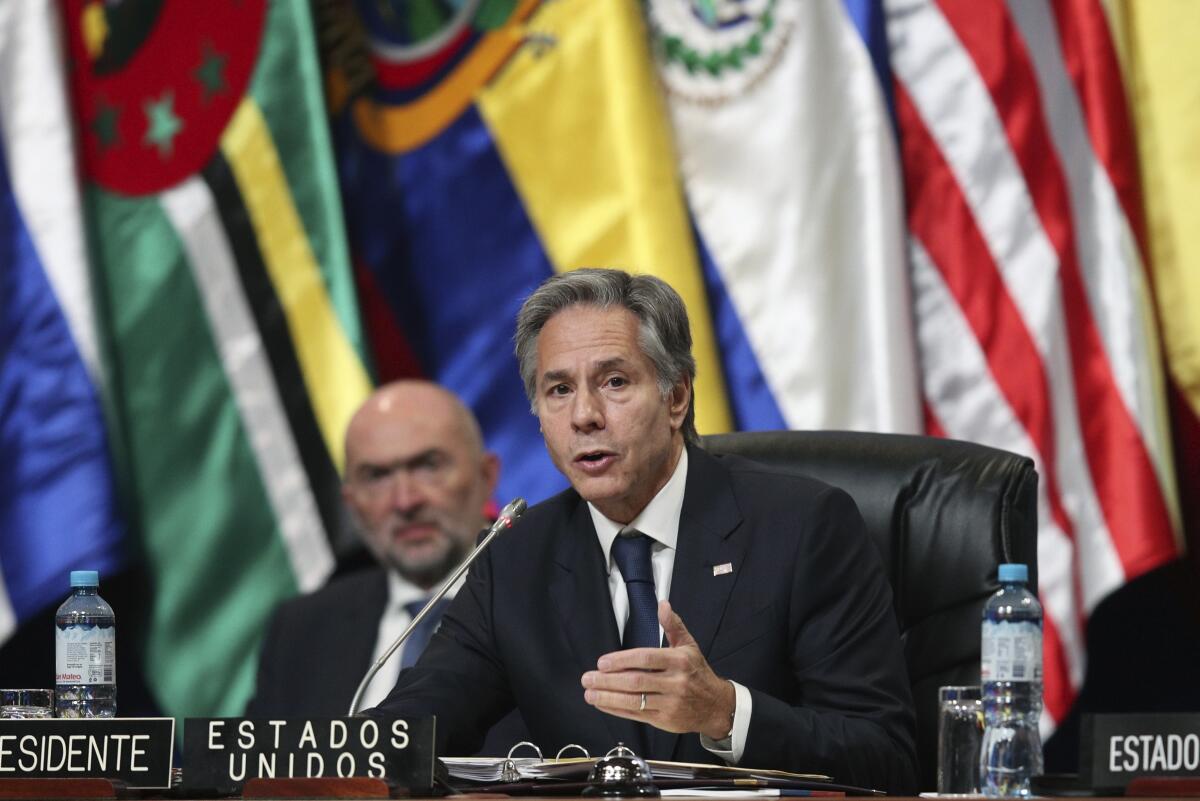U.S. pledges $240 million to address migration in Latin American countries

LIMA, Peru — Leaders from many of the Western Hemisphere’s nations attempted Thursday to tackle the region’s most intractable problems, including the deterioration of democracy and the displacement of millions of people, but they found few solutions.
Secretary of State Antony J. Blinken, leading the U.S. delegation of the 52nd summit of the Organization of American States, announced that the Biden administration is giving $240 million to Latin American countries that have been hit hardest by the forced migration of Venezuelans and Colombians. The money will also go toward helping countries along irregular migration routes to make their borders safer; to provide immigrants with legal status and work permits; and to combat human trafficking.
The multipronged effort grew out of the Summit of the Americas held in Los Angeles in June.
Blinken also met Thursday with human rights defenders from the three most glaring absentees from the event: Cuba, Nicaragua and Venezuela. Cuba did not join the OAS. Nicaragua, which is led by brutally autocratic President Daniel Ortega, dropped out. And Venezuela’s status is in question.
The secretary of State praised the five dissidents he met — all women — for working to give voice to those silenced by their governments. The United States “stands in strong solidarity” with those who are trying to exercise their rights, he said, and wants “to do more, do better” to help citizens “fill their aspirations.”
Blinken and the women gathered in the opulent colonial residence of the U.S. ambassador. Reporters traveling with the secretary of State were allowed to attend during his brief opening remarks and then ushered out of the room.
Venezuela was one of the most contentious topics at the two-day OAS meeting. U.S. officials have long boasted of regional unity in trying to isolate and eventually unseat the government of President Nicolas Maduro, which has plunged the country into despair and poverty. Washington backs a Venezuelan opposition politician, Juan Guaido, and engineered a way for his allies to be represented at the OAS instead of Maduro’s government.
But on Thursday, the unity seemed to fade. About a dozen countries went against U.S. wishes and voted to consider booting Guaido’s representatives. Only three countries sided with the United States. There were numerous abstentions, however, and the motion failed to get the legally required two-thirds majority for approval.
Blinken, asked later if blows like the vote will undermine the administration’s support for Guaido, said the policy of pressuring the Maduro government with sanctions and other measures to force elections and a return to democracy has not changed.
Ronald Sanders, the OAS ambassador from Antigua and Barbuda, said allowing Guaido to sit in the regional body was illegal because he was not the elected leader of Venezuela.
“Here today, nobody won — the OAS lost,” Sanders said. “It lost once again its credibility.”
He said his delegation would not support any measure or resolution on which Guaido’s representative voted.
Haiti, the hemisphere’s poorest and most tumultuous country, also received special attention. Haiti has been reeling since its prime minister was assassinated last year. Armed gangs have taken over large parts of the country, and access to food and fuel is dwindling rapidly for ordinary Haitians. A new outbreak of cholera was reported there this week.
Blinken said the U.S. was “deeply concerned” at swiftly deteriorating conditions on the island and said the international community had to continue supporting Haiti. Outsiders would be hard-pressed to point to any progress from international help. Haitian Foreign Minister Jean Victor Geneus said gangs are operating not out of political goals, but self-interested enrichment, and badly outgun Haitian security forces.
More to Read
Get the L.A. Times Politics newsletter
Deeply reported insights into legislation, politics and policy from Sacramento, Washington and beyond. In your inbox three times per week.
You may occasionally receive promotional content from the Los Angeles Times.











